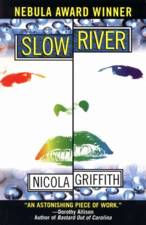

| Click on a book's image or title to order from Amazon.com |

Slow River
Del Rey, TPB, © 1995, 343 pp, ISBN #0-345-39527-9Reviewed April 2002
I enjoyed this book despite myself. It's told - somewhat clumsily - in three separate threads: In one thread, we learn of the life of Frances Lorien van de Oest from the age of 7 until she is kidnapped at age 18. The child of a wealthy family whose business processes waste and reclaims sections of the world ruined by industrial development or human meddling, 'Lore', as she is known to us, tries to win the favor of her mother and father in a tumultuous family including three siblings.
In the second thread, Lore escapes from her kidnappers to the relative safety of a woman named Spanner. Becoming lovers, Lore gradually comes out of her shell and helps Spanner first make money by stealing peoples' personal record devices ('slates'), and then by becoming a high-class prostitute. Humiliated by her ordeal, Lore refuses to return to her family, adopting various false identities.
In the third thread - told, unlike the other, in the first person - has left Spanner and now works as a grunt in a water-and-sewage treatment plant. Her boss, Magyar, is suspicious of her - Lore is forging a permanent false identity - and the plant is understaffed and poorly managed. Lore is trying to find her own path and trying to break away from all her pasts.
It took me a while to get into this book. The constant switching between the three threads is frustrating, and I think it would have been smoother had the thread with Spanner and the thread after Spanner been told sequentially as a single thread. Then there's the scientifictional hook: Sewage treatment? Eew. Griffith's familiarity with the subject is impressive, but not by any stretch of the imagination exciting. The end goal is still just to remove the junk from the water to make it drinkable again.
But Lore eventually won me over. Her growth from a girl with no identity into a woman with a false identity and finally a woman making her own identity is deftly handled, and her developing sense of right and wrong and her desire to do right by others (albeit not at the cost of compromising herself) makes you like her as a character. And her background has some hidden mysteries which she has to unravel before she can really be at peace with herself. Her competence and professionalism at her job at the plant are admirable, especially when (so to speak) the s**t hits the fan. Lore is, by the way, a lesbian (as are Spanner and a few other characters); eventually it seems like everyone in the story save for Lore's parents are, which seems rather unbelievable. It's also at times very sexually explicit, which might turn off some readers.
The book's story is small, but Lore's internal struggle looms larger and larger as it progresses, and eventually becomes compelling. The end is a bit of a letdown as it is rather abrupt and we don't really see the payoff of some of the things Lore decides she needs to do. The story therefore seems incomplete.
Griffith also plays around with characters' names, which was sometimes entertaining to play with. 'Spanner' is the character who spans two periods in Lore's life; Lore's false identity as she tries to fly away from Spanner is Sal Bird, and so forth. These are little things, though.
It's an enjoyable read, and an impressive character study. I'm not sure I'd pick it as a Nebula Award winner (which it was), but it's worth a look nonetheless.
hits since 7 April 2002.